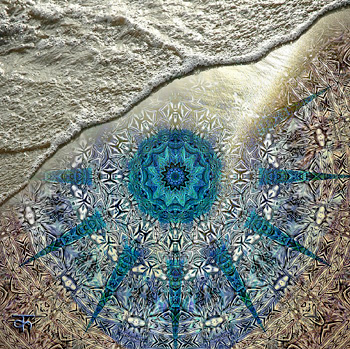| A
Postcard From the Path |
 I've come to understand
spiritual development as a process that travels from a position of
exclusion to one of complete inclusion. I've come to understand
spiritual development as a process that travels from a position of
exclusion to one of complete inclusion. The exclusionary position may be one of either atheism (especially "strong" or explicit atheism: "I believe there is no God) or traditional theism ("God is out there"). The process seems to travel naturally toward pantheism: "God is identical with all of reality." In my opinion though, pantheism is still not a completely inclusive position - that honour goes to panentheism. This idea comes naturally out of the search I've been on for the last few years: I started life as a positivist atheist, but after a while almost blew out psychologically from the lack of any sense of the sacred to anchor my life. When I went looking for it, I found the first traces of that sense of the sacred in Deep Ecology (all life has intrinsic value), then more of it in pantheism (God is identical with the natural universe). Both of these are naturalistic ideas that didn't ding my veneer of scientific rationalism too hard. Next on the menu were non-dualist philosophies like Zen and Taoism. Further along the non-dualist path, Advaita teaches that we are identical with Brahman and Jnana Yoga teaches that we "are" consciousness. Following that path towards the sacred led me to this recent conclusion. I am actually a panentheist for whom Consciousness is a supreme sacred manifestation, identical to what others call "God". The key for me is that in traditional panentheism, God acts both in the world and outside it; creates reality yet works within it; is both transcendent and immanent at the same time. In David Bohm's terms, God both enfolds the implicate order and unfolds the explicate order. For me that God-role is entirely and adequately fulfilled by Consciousness. Consciousness is the vessel within which my reality occurs, and yet my consciousness acts within reality at every moment. Consciousness is the manifestation of the divine, in the exact way that God is described in classical panentheism. So, that's all fine if one is looking for an elaborate framework for the sacred. Lately though, yet another layer of the onion has been peeled back. Truly, completely inclusive awakening involves transcending even the notion of "sacred". It involves transcending all belief and non-belief, all notions of judgemental relationship like higher/lower or better/worse, all the concepts and structures that our mind lays over reality - including concepts of the sacred, or God or the Absolute, or the Void. Paradoxically this "transcendence of the divine" seems to bring us full circle like Ouroboros, and we find ourselves back where we started - right back in the lap of purely ordinary reality. The difference with this version of "ordinary reality" is that our grasping, clinging, resisting, rejecting needs have been resolved by the lessons of our journey. We are offered in their stead a clear perception of What Is. All that is left for us is to dive back into the Dance of Lila, but now with the awareness that we are simultaneously dancing and choreographing. Travelling this path to its conclusion leaves us with all the elements of our story intact. In my case this means:
This perspective informs fundamentally my position on the unfolding "Global Predicament of Ecology and Human Civilization". From here our situation is revealed as not being a predicament at all. Such a divided, conflicted, judgmental interpretation of the situation is seen to be a product of our attached perspective from inside its ongoing self-expression. From a point of view outside the unfolding of our reality, from the pantheist or panentheist perspectives for example, the "predicament" is revealed to be just the way Life is expressing itself at the moment. Transcending the apparently final position of being an unattached witness to that unfolding is what allows us to carry this awareness back into the core of the Dance itself. That act of re-entry - coming back into the Dance as pure Consciousness - allows us to participate in Life again; but to participate without judgement or reservation, with joy and complete commitment. In that moment of completely ordinary simplicity, our value to ourselves, our species, all of life, the universe and reality itself becomes as great as it can possibly be.
Paul Chefurka |
| This
article may be reproduced in whole or in part , in any manner and for
any purpose whatsoever, with no restrictions. |